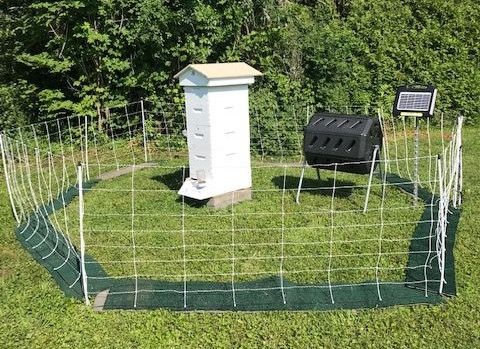Did you compost growing up?
We always had a garden to bury stinky food scraps as well as a Labrador retriever and chickens to eat most meal left-overs. Not true composting, I guess.
Why did you start composting?
Years ago, we were given an upright composter as a gift. I found it difficult to use by itself, and so for years it didn’t get used much. Later, I heard of all the problems people composting were having with bears and so I wanted to learn more about how composting could be done without attracting bears and other wildlife. I attended a composting workshop and then purchased a sturdy tumbler which I now use in conjunction with the upright composter in the winter months as well as still burying (“trench composting”) the smelliest items in my garden. My family deposits vegetable scraps, some fruit peelings, as well as coffee grounds and eggshells in the small compost container in our kitchen and I take it from there.
What’s your system for collecting food scraps?
We place our food scraps in a 2-gallon metal container which has a charcoal filter in the lid. This container is kept in the kitchen near the sink. All large items are sliced up into smaller pieces and the inorganic stickers taken off apple and banana skins. The can ends up getting emptied pretty frequently, probably every three days or so because I place dry material such as wood shavings in the bottom third of the container after each time I empty it and before it comes back into the kitchen.
How is your compost system set up?
I am pretty happy with my sturdy plastic tumbler. No animals can get in it and it is easy to mix and turn over by simply giving it a push. I wasn’t able to get it up to the temperatures recommended for true composting and finally settled for “cold” composting where the material is well-mixed and worked into my garden in buried trenches that get thoroughly mixed with the soil when I rototill the garden each spring.
Do you compost through the winter? If so, do you do anything differently?
When the soil in my garden is too frozen for digging, I leave my tumbler alone once it is full. The rest of the winter I place kitchen scraps in the upright plastic composter. It is large enough that it can contain a winter’s worth of scraps along with mixed-in dry matter. In the spring, I mix it well and then it all gets emptied into trenches in the garden before I do the rototilling. I don’t use the upright plastic composter anytime after the bears are out of hibernation as it would be too easy for a bear to pull it apart.
Have you had any problems? If so, what do you do to fix them?

I have had no problems, really, once I realized I didn’t have to do “hot” composting, but that “cold” composting would work fine for my needs. My compost doesn’t smell any that I can tell, and it does not attract wildlife. To ensure of this, I place the tumbler inside the electric fence I already have for protecting my beehives from bears. My hard-plastic tumbler may have been “bear-proof” on its own, but since I already had an electric fence for my bees I keep my tumbler safely within the fenced area.
Do you use your finished compost on your yard or compost just as a way to manage food scraps?
The finished compost goes into the vegetable garden and has become an important component of my garden management.
What do you like about composting?
I like the fact that we can make use of our food waste and that none of it has to end up in the landfill. There is an initial cost to getting set up, but I take satisfaction in having an organic waste disposal system that works. I have always taken pride in living lightly on the land and this is one more way of doing that.
What would you say to encourage someone who is hesitant to start composting?
Don’t start unless you plan to do it right. It certainly isn’t rocket science, but it is easy to do it wrong without some guidance. Do your homework and do it right in a way that works for you. It should be done without giving off odors or attracting wildlife. The last thing you want is a stinking pile of garbage attracting animals to your back yard. Take a class on composting or get on the internet and research how to compost correctly.
Anything else you want to share or wish I had asked?
As a wildlife biologist I feel strongly about this - if you want to compost without attracting animals, then make sure your backyard does not already have other attractants that would bring in wildlife. If you have birdseed out for the birds anytime but during the winter, then you will attract bears, and once already in your backyard, the bears will also try to tear into your compost, even if it is not giving off much for odors. Feed the birds only during the winter months, and this will help you to be a successful composter.

